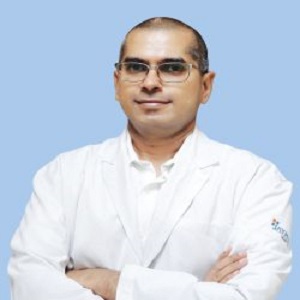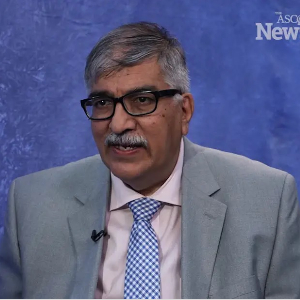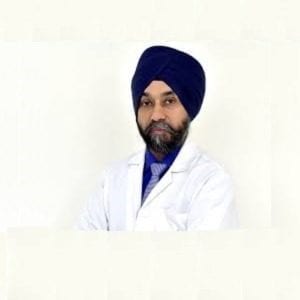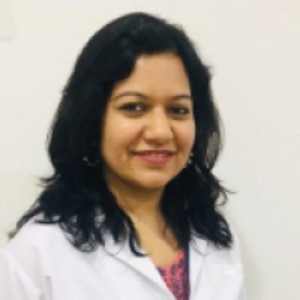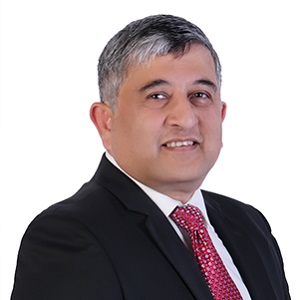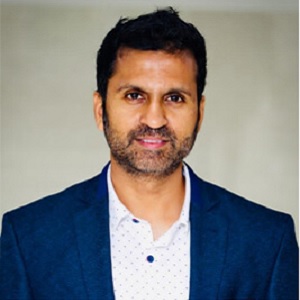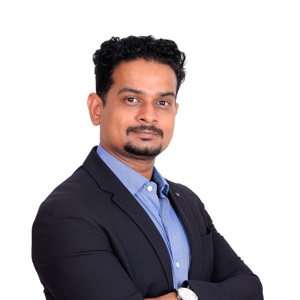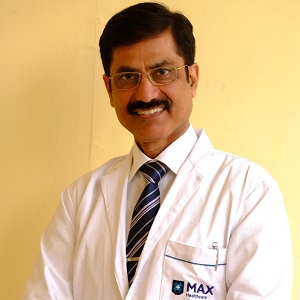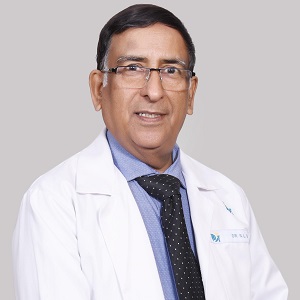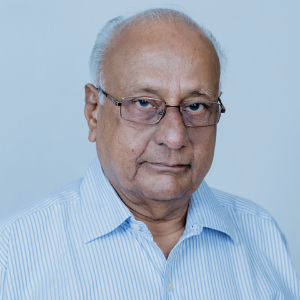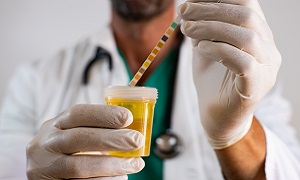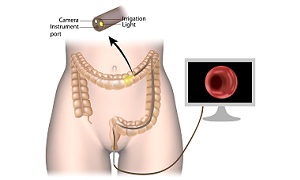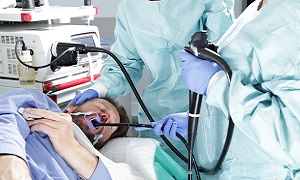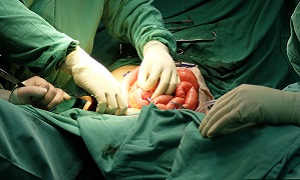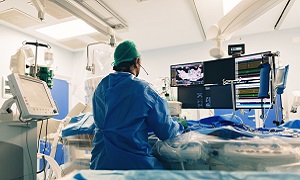Best Doctors in India for Carcinoid Tumors Treatment
- Liver Transplant Surgeon & HPB Surgeon, Noida, India
- Over 17 years’ experience
Profile Highlights:
- Dr. K R Vasudevan is a surgical gastroenterologist who has been trained at one of India’s best hospitals. Over a short span of 17 years, his career has progressed to the role of leading a team.
- He has established and sustained a liver transplant program at PSRI over the last few years. Due to his experience with over 1200 live donor liver transplants, he was selected for this role.
- Director and Head Medical Oncology/Hematology, Gurugram, India
- Over 40 years’ experience
Profile Highlights:
- Dr. Rakesh Chopra is a well-known Medical Oncologist with national and international repute as one of the best in the treatment of all types of blood cancers including leukemia, lymphoma, multiple myeloma, and bone marrow transplant.
- His specialization lies in blood cancer and also provides treatment for solid cancers of the breasts, lungs, prostate, colon, and GI.
- Medical Oncologist, Gurugram, India
- Over 20 years’ experience
Profile Highlights:
- Dr. Randeep Singh has trained extensively in managing cancer patients at the prestigious Tata Memorial Hospital, Mumbai.
- After spending over 20 years in this field, he has a vast experience in breast, lung, and gastrointestinal cancers.
- Throughout his career, Dr. Randeep Singh has had over 40 publications in national and international journals.
- He has also attended and presented various scientific papers in national and international journals.
- Surgical Oncologist, Gurugram, India
- Over 10 years’ experience
Profile Highlights:
- Dr. Shilpi Sharma is a highly experienced surgeon and oncologist who has previously worked in prestigious institutions such as Tata Memorial Hospital, and National Cancer Institute.
- Throughout her career, she has conducted various high-quality research in the field of head and neck cancers. Dr. Shilpi Sharma has also been part of various randomized and nonrandomized trials and has also been involved in clinical and translational research.
- She is also a member of ICMR guideline committee which formulated the ICMR guidelines on tongue cancers.
- HBP & Liver Transplant Surgeon, Bengaluru, India
- Over 35 years’ experience
Profile Highlights:
- Dr. Sanjay Govil is an accomplished HBP & Transplant Surgeon. He completed FRCS from the Royal College of Surgeons in England.
- He has achieved a few major accomplishments throughout his life as well, which include the First Liver Resection in Karnataka, in 2007, First Laparoscopic Liver Resection in a Cirrhotic Liver in Karnataka in the year 2008, First Laparoscopic Pancreatic duodenectomy in Karnataka in 2008, First ALPPS procedure in India in 2012 and several more.
- He trained in liver surgery and transplantation at Kings College Hospital in London, Queen Mary’s Hospital in Hong Kong, and the Graduate School of Medicine in Tokyo.
- Hepatologist & Gastroenterologist, Chennai, India
- Over 18 years’ experience
Profile Highlights:
- Dinesh Jothimani is a Hepatologist and Gastroenterologist with over 18 years of experience.
- He completed his MRCP (UK) from the Royal College of Physicians, London in 2004.
- Dr. Dinesh Jothimani is a liver specialist trained in the UK and Australia. He cares for his patients who suffer from liver diseases and performs skillful liver transplants.
- Senior Consultant - Hepatology and Liver Transplant, Mumbai, India
- Over 13 years’ experience
Profile Highlights:
- Dr. Uday Sanglodkar is a highly motivated and compassionate medical gastroenterologist with experience in hepatology/transplant hepatology.
- Dr. Uday Sanglodkar has vast experience in pre and post-liver transplant care, liver intensive care management, and evidence-based management of gastrointestinal and liver diseases.
- Dr. Sanglodkar is also an expert at diagnostic and therapeutic gastrointestinal endoscopy.
- Liver Transplant Surgeon, New Delhi, India
- Over 30 years’ experience
Profile Highlights:
- Dr. Sanjiv Saigal is a trained Hepatologist who has spearheaded the medical team of liver transplantation in the largest liver transplant program in India for over a decade
- Dr. Saigal is a bright name in the field of Gastroenterology and a famous liver transplant specialist with over 3400 successful Liver Transplants in his career.
- Medical Gastroenterologist, New Delhi, India
- Over 54 years’ experience
Profile Highlights:
- Dr. Sohan Lal Broor is a Gastroenterologist and has an experience of 54 years in this field. Dr. Broor practices at Indraprastha Apollo Hospitals in New Delhi.
- He completed MBBS from Panjab University in 1967, MD – Medicine from PGIMER, Chandigarh in 1972, and DM – Gastroenterology from PGIMER, Chandigarh in 1974.
- Dr. Sohan Lal Broor is a member of the 2-Year Fellowship in Gastroenterology at Medical College Of Wisconsin, Milwaukee, USA.
- Some of the services provided by Dr. Broor are Irritable Bowel Syndrome ( IBS ) Treatment, Peptic/ Gastric Ulcer Treatment, Inflammatory Bowel Disease (IBD) Treatment, Hemorrhoids Treatment, and Gastritis Treatment.
- Medical Oncologist, Chennai, India
- Over 40 years’ experience
Profile Highlights:
- Dr. Bellarmine Vincent Lawrence is a well-known Medical Oncologist in South India with a specialization in the treatment of breast cancers.
- He provides overall both pre and post-operative treatment of breast cancer that includes diagnostic, therapeutic as well as palliative care.
- He also provides services for other types of cancers including blood cancer and does procedures like Chemotherapy for the treatment and biopsies for the detection of cancer.
Best Hospitals in India for Carcinoid Tumors Treatment
Carcinoid Tumour
Carcinoid tumour is the cancer of neuroendocrine, the system that is responsible for the production of hormones. It is a rare cancer & the tumour usually grows in the intestines or appdendix, it may be found in the stomach, pancreas, lung, breast, kidney, ovaries or testicles as well.
Signs & symptoms of Carcinoid Tumour
The symptoms of carcinoid tumour depends on the location of the tumour.
- A bowel carcinoid tumour causes pain in the lower abdomen, diarrhoea, constipation & bleeding from the rectum.
- A carcinoid tumour in the lung may cause cough, breathlessness, pain in the chest & fatigue.
- A carcinoid tumour in the stomach may cause loss of appetite, fatigue, pain in the stomach.
Causes & risk factors of Carcinoid Tumour
The exact cause of carcinoid tumour is not known, but there are certain factors that increases the risk of developing carcinoid tumour, which are:
- Having family history of multiple endocrine neoplasia type 1 (MEN1) increases the risk of developing carcinoid tumour.
- People who are suffering from diabetes for a long time may develop carcinoid more likely.
- Inflammation of stomach lining increases the risk of developing carcinoid tumour.
- Smoking & intake of alcohol may also increases the risk of developing carcinoid tumour.
- Obesity have double risk of carcinoid tumours.
Diagnosis of Carcinoid Tumour
Urine test
PET- CT scan
PET- CT scan is done to see the tumour & check if the cancer has spread anywhere else in the body.
MRI
MRI is a cross section picture of the body is created by the use of magnetism and radio waves.
Colonoscopy
Colonoscopy is used to check for bowel carcinoid tumour.
Biopsy
Endoscopy
Treatment of Carcinoid Tumour
Carcinod Tumors are generally treated using a combination of the following:
Surgical & other interventions
Surgery
The surgical options includes:
- Appendoictectomy- It is the surgical removal of the appendix.
- Colectomy– It is the surgical removal of the colon.
Hepatic artery embolization
During hepatic artery embolization, the blood to a carcinoid tumour that has spread to the liver is blocked.
Somatostatin analogues
Somatostatin analogue stops the body from producing too may hormones & may also slow down the growth of tumor.
Chemotherapy
Chemotherapy is the use of anti-cancer drug that helps to slow or stop the growth of rapidly dividing cells that cause cancer. It prevents the growth of rapidly dividing cells by killing the dividing cells.
Despite its side effects, chemo is still the most widely used cancer treatment option. Unlike radiation and surgery which treats cancer cells at particular locations, chemotherapy drugs can kill cancer cells that have metastated (spread) to different organs in the body.
Radiation Therapy
Radiation Therapy is a kind of cancer treatment that uses high doses of radiation beams to kill cancer cells to shrink the tumors. Radiation kills the cancer cells by destroying the DNA. Cancer cells with damaged DNA fail to multiply and die. They are then removed by the body’s mechanism.
Radiofrequency Ablation
Radiofrequency ablation is also nowadays used in cancer treatment. It is used to treat a spot of cancer that is causing problems such as pain or other discomfort, although it is generally not used as the primary treatment for most cancers. The radiologist uses imaging tests to guide a thin needle through the skin or through an incision and into the cancer tissue. High-frequency energy passes through the needle and causes the surrounding tissue to heat up, killing the nearby cells.

